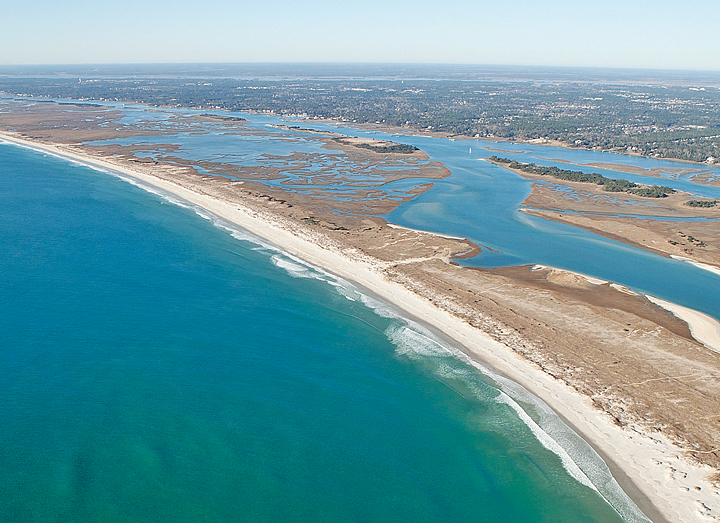By Lena Moriarty
Intern
Efforts to bring oyster farming to the Masonboro Island reserve will come to an end in 2021 unless the farmers are able to overturn a ruling by state regulators that blocks the five-year leases from being renewed.
Oyster farmers Tim Holbrook and Al Smeilus were granted leases for the reserve in 2015 and 2016 by the state’s N.C. Division of Marine Fisheries, however, last November, another state agency asserted jurisdiction and objected to renewing the five-year leases. Smeilus and Holbrook are now searching for a way to reverse the decision, while defending the benefits of oyster farming in the Masonboro Island reserve.
“What you’re doing is going out in an area with nothing on it, and turning it into something that is productive and good and is beneficial to the reserve,” Smeilus says of his primarily cageless oysters.
Though approved by the Division of Marine Fisheries in September 2015, another state agency in November said that the 5-year-leases for two oyster farms in the Masonboro Island reserve should not have been granted approval, saying the leases won’t be renewed once they expire. While governed by the state’s Department of Environmental Quality Coastal Resource Commission, the island’s reserve is also designated as a State Nature Preserve, putting it under regulations established by the Dept. of Natural and Cultural Resources’ Natural Heritage Program (NHP).
The NHP in November said that the two oyster leases issues for the reserve weren’t in compliance and therefore, shouldn’t be renewed. The leases were found to violate North Carolina’s Nature Preserves Act which is enforced by NHP.
Because there is no way to appeal the decision of the NHP, Smeilus said he is going to lose thousands of dollars in personal investments in his business.
Advocates for Masonboro Island said the state should not end the leases for the oyster farms that have been operating for the past three years in the island’s reserve.
The decision sparked confusion and concern among some members of the community, including individuals from Masonboro.org, an organization that advocates for public access to the island, who said that the decision raised even more questions about transparency, with some calling it a “violation of public trust.” The violation was brought to the public’s attention for the first time at the Masonboro Local Advisory Committee after the leases had been implemented and the harvesting had begun. At the meeting, some raised concerns about the negative effects of oyster farming, said Richard Johnson of Masonboro.org.
“We’re involved because we think the process he went through was a fair and open process, but what happened next was not. At the end of the day, there has to be some level of public trust,” Johnson claimed. “We’ve been protecting public interest for 10 years now.”
At the time of application, Coastal Reserve officials said they worried that these leases might lead to a swarm of other leases, to which there was no confirmed policy in place. In November 2015, a study of the oyster farms was authorized to develop a policy regulating future oyster farming. The goal of the study is to research the importance of various habitat types and web structures, including oysters, and their effects on the coastal community.
As advocates push back on the decision, they are hoping the study will show a historical tie between Masonboro Island and shellfish farming that could be used to justify reversing the decision.
“We have to look at new ways of being able to manage the resources in a sustainable fashion,” says Smeilus, “I’ve noticed in harvesting oysters they’re getting fewer and fewer, even in the reserve, the resources are dwindling away.”
Johnson said he believes that this situation is a violation of the public’s trust and claims that the NHP had never been involved with coastal issues until recently.
“North Carolina is about 20 years behind on oysters,” Johnson said of the benefits of oyster farming. He compared North Carolina oyster laws to those of Chesapeake Bay, where individuals are paid to farm oysters because of the positive contributions they have on the environment.
In the meantime, Smeilus is working with the state and the Marine Science Center, where he had opened up his lease to a three year study and funded by NOAA to see the impact planting oysters has on the reserve.
“I wanted to bring oysters in to contribute to the water quality and the water clarity in the area,” says Smeilus of his oyster farm.
Masonboro Island oyster farmers seeking solution after state denies lease renewals




